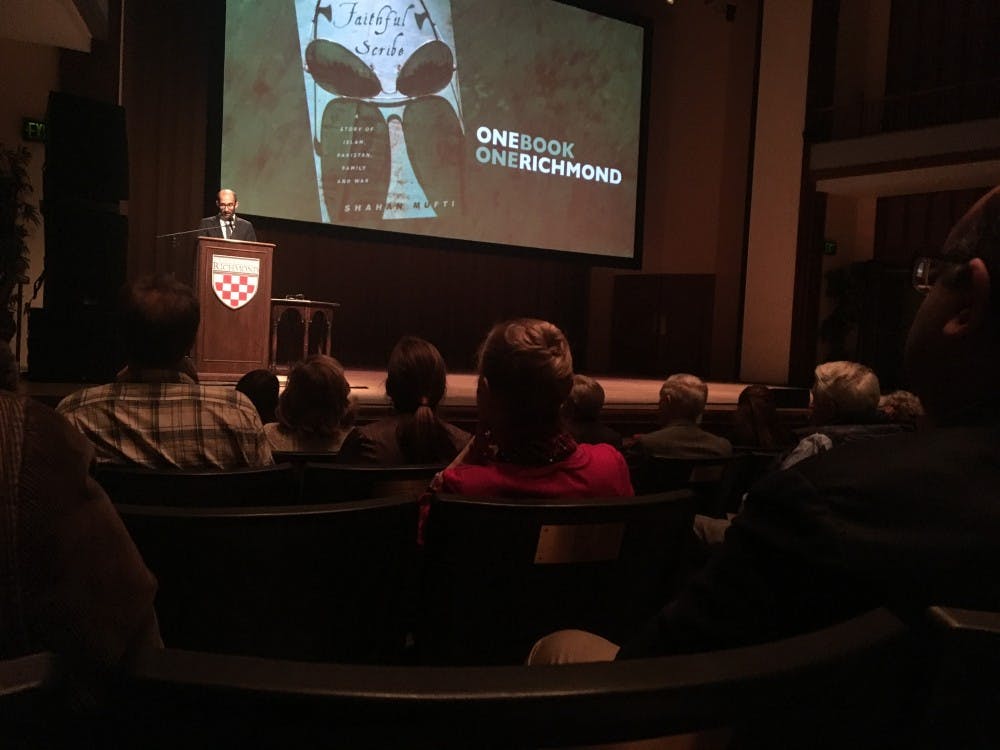A University of Richmond assistant professor of journalism spoke about the parallels between the United States and Pakistan during the One Book, One Richmond keynote speech last week.
Shahan Mufti spoke about his book “The Faithful Scribe: A Story of Islam, Pakistan, Family, and War,” and his shared Pakistani-American culture at the One Book, One Richmond keynote speech.
Violence and politics are similar in Pakistan and the United States, he said, although they are manifested in different ways.
“I hear these echoes of war between my two homes all the time,” he said.
Mufti said current political issues in the U.S., such as police violence and mass shootings, drew similarities to suicide bombings and attacks in Pakistan — citizens were turning their weapons on their own people.
The terrorist occupation of Pakistan’s Swat Valley and the shooting of Malala Yousafzai resembled the white supremacist march in Charlottesville, Virginia, and the hit-and-run death of Heather Heyer, Mufti said.
“The weapons turn from a handgun into a car, the long hair turns very short, the black turbans turn into white shirts, and the statues must be torn down in one place and they must be defended in another one,” he said.
Mehreen Usman, sophomore, and the child of Pakistani immigrants, attended the event. She appreciated Mufti’s perspective on problems in both countries, she said.
“I was born in America but my parents had the same kind of thing where they’re American citizens now but were born and raised in Pakistan,” Usman said. “And so I think it’s interesting how you can have two different perspectives on things and think about how other people thought about war.”
Mufti also addressed Pakistan’s military coup, comparing its pervasive military to the presence of several active duty military troops in the current U.S. presidential administration. He specifically referred to an incident when John Kelly, White House chief of staff and retired general, would only take questions from reporters with a direct connection to fallen soldiers.
“I was shocked to see him speak as a soldier and not as a public servant," Mufti said.
Mufti addressed the current White House administration several times throughout his keynote speech and said the mental and emotional capabilities of the president were fragile.
Enjoy what you're reading?
Signup for our newsletter
Toni Doland of Chesterfield, Virginia, attended the event and commended Mufti for his insightful commentary.
“His remarks were very brave to point out some criticism that is thought-provoking,” Doland said. “I’m so glad I came, and I think he was pointing out really fundamental issues for our countries that are easy to forget when you’re looking at the day’s headlines.”
Mufti said that in order to solve the problems he had described, citizens would need to pay more attention to the wars one might not notice in the U.S.
At one point during his talk, Mufti called upon the words of Heather Heyer: “If you’re not outraged, you’re not paying attention.”
Contact news writer Alexis Angelus at alexis.angelus.richmond.edu.
Support independent student media
You can make a tax-deductible donation by clicking the button below, which takes you to our secure PayPal account. The page is set up to receive contributions in whatever amount you designate. We look forward to using the money we raise to further our mission of providing honest and accurate information to students, faculty, staff, alumni and others in the general public.
Donate Now



